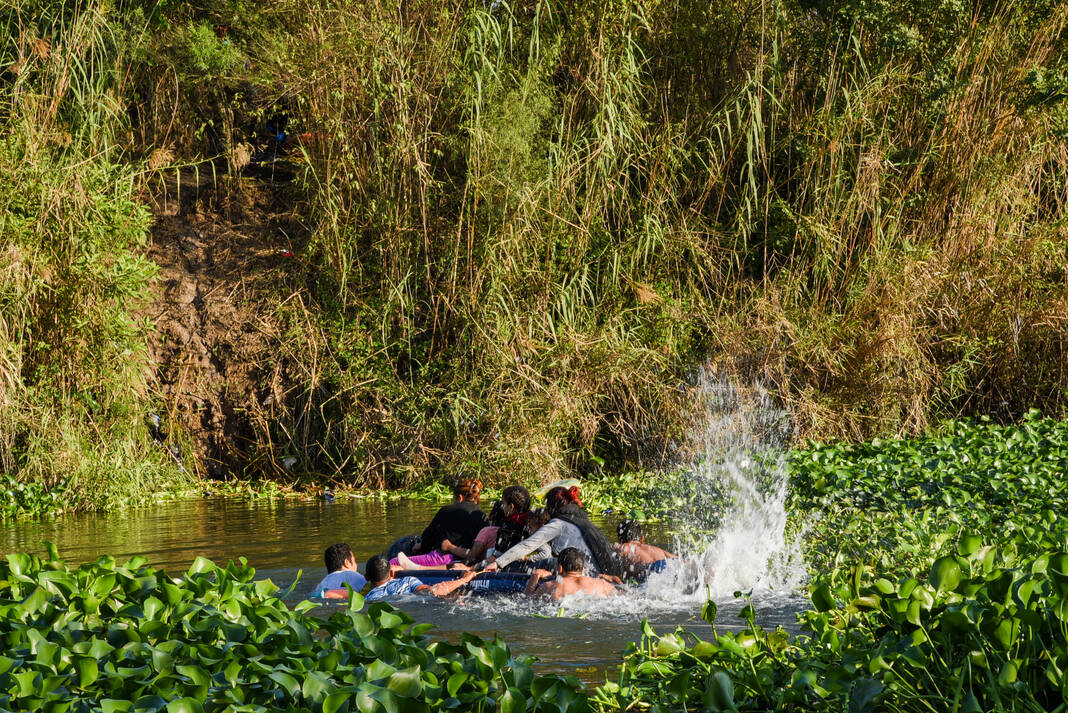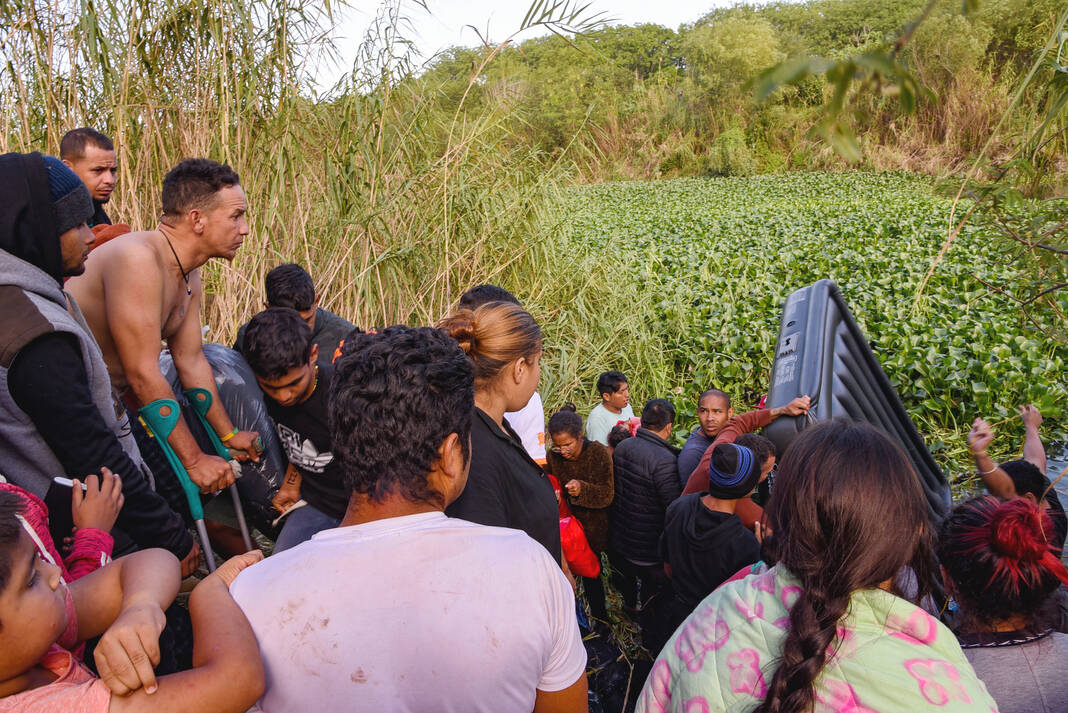Inflatable mattresses doubled as rafts ferrying families, many from Venezuela, from Matamoros to Brownsville as desperation took hold among thousands waiting for the end of a pandemic border policy.
Young men climbed trees to see over the crowd of people surrounding the riverbank just a few hundred yards from Gateway International Bridge on Wednesday afternoon.
The crowd watched intently as a self-assembled team of immigrants tied a yellow rope around a plastic mattress and loaded people onto the shaky inflated plastic.
Men swam around the edges propelling it with flutter kicks.
“The men are the motors,” said one man who had stripped down to his underwear waiting to get in and help.
The temperature lingered around 60 degrees, but those who got in the water shivered as the river enrobed them.
Spontaneous cheers erupted as a shirtless man in crutches and a prosthetic leg approached the river. He was guided and lowered by the crowd of hands and arms that extended upward as a bucket brigade.
“Vamos, mocho. Asi, asi!” one man shouted, saying “mocho,” a Spanish slang for someone with a missing limb. The crowd used it as a term of endearment as they clapped and encouraged him during the swim across the river.
Bao Chaudary, 41, a Venezuelan woman sat close by as she waited for her chance to cross with her partner, Yerika Galue, and their two girls.
They left their country where same-sex couples struggle to be recognized legally. After journeying through seven countries, the deadly Darien Gap jungle and rivers, the family arrived in Matamoros two months ago.
One of their girl’s hands gripped the edge of the mother’s jacket as they waited for the raft to come back from the U.S. side where Border Patrol waited for immigrants to climb out of the water and turn themselves in.
“We’re afraid to cross,” Chaudary admitted.
She dug her face in her hands and held her prostrate head while the waiting stretched longer.
“I love them and my partner. That’s why I’m taking the risk. It will have to be the U.S. to tell us if yes or no, because we can’t keep waiting,” she said. “A cold front, an intense cold front is coming and we can’t sleep on the street anymore.”
“There’s a fear that they’re going to return us. That because of Title 42 there’s a chance that we’ll be back here, but there’s some hope,” Chaudary added, referring to the public health policy enacted in March 2020. Title 42 sends immigrants seeking asylum back to Mexico, but it could end soon with a pending decision from the Supreme Court.
“Fear paralyzes you, but love moves you,” Chaudary said as the time drew closer for the family of four to jump onto the raft.
Chaudary’s family were also on a list to be considered for an exemption process that started several months ago at the Matamoros port of entry.
Hundreds of people lined up Wednesday before staff from the Sidewalk School, an American non-governmental organization, which continued creating a list of people who U.S. Customs and Border Protection could consider for a Title 42 exemption.
“This is overwhelming,” Felicia Rangel-Samponaro, the Sidewalk School co-director, said over the loud hum of the clamoring crowd.
“This is our shortcut version where they take down your name and phone number. Then after this, they go back to our main office,” Rangel-Samponaro said, referring to the staff. “They’ll contact the asylum seeker and ask for personal information.”

Immigrants volunteered to protect the lines of women and children forming toward the tables where Sidewalk School staff sat and took down information for nearly three hours.
The lines grew so long and tense, immigrants began marking their arms with numbers to keep people from skipping.
“You have to keep in mind the exemption process may end, but all this still serves a purpose,” Rangel-Samponaro said. “If you don’t see an American NGO out here, I don’t know about you but I’d be really frustrated. Nobody is telling me anything. What’s happening? Why am I not crossing?”
The Sidewalk School along with other organizations were briefed on the possible changes once the U.S. lifts Title 42. Armed with the latest updates from the government, volunteers disperse the information through multiple channels.
“We’re at least out here hearing what people have to say and answering the questions that the U.S. government is giving us, not the rumors you are hearing in these camps,” Rangel-Samponaro said. “And then you can make a decision whether you want to continue staying in this camp or go somewhere else like back home or further into Mexico. People need this information.”
On Thursday, the city of Matamoros is planning to move many living in the camp to an emergency shelter ahead of the arctic blast, but rumors circulating among camp residents fearing deportation from the shelter may hamper the city’s efforts.
Rangel-Samponaro and staff will be moving their operations to the shelter, hoping to incentivize families to move out of the cold and into a safer environment while they wait for the Supreme Court to make a life-changing decision.
Editor’s note: This story was updated for clarity.





